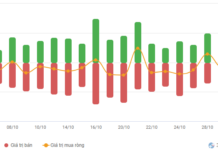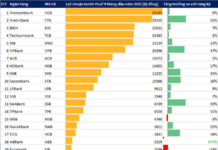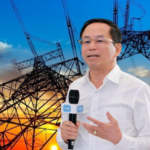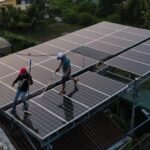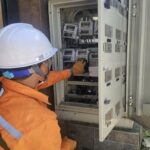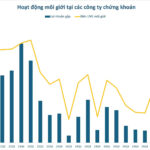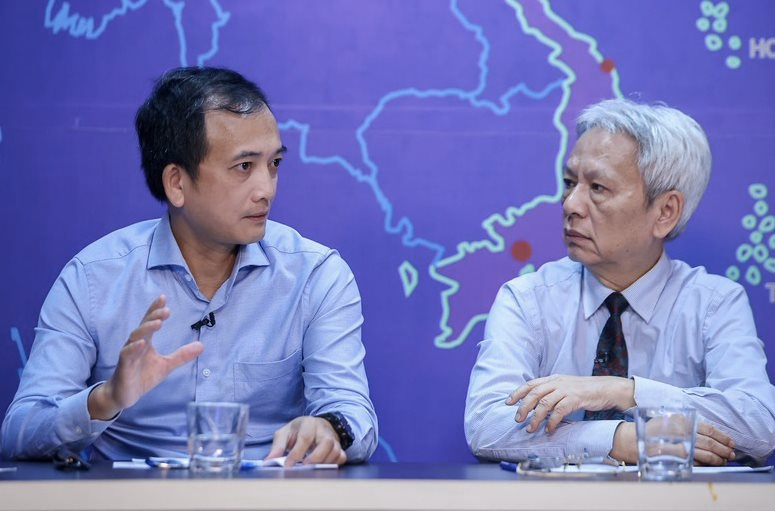
Deputy Director of the Electricity Bureau Trinh Quoc Vu in discussion with Dr. Nguyen Si Dung. (Photo: VGP)
At the seminar on “Sustainable Development of the Electricity Industry – Issues to be Addressed” organized by the Government Portal, Mr. Trinh Quoc Vu, Deputy Director of the Electricity Bureau (Ministry of Industry and Trade), said that it is necessary to clarify which reasonable and legitimate costs of the Vietnam Electricity Group (EVN) have not been accounted for and fully calculated into the retail electricity price.
In 2022 and 2023, the geopolitical conflict between Russia and Ukraine caused significant fluctuations in the world’s primary energy market, particularly an unusual surge in prices.
For example, in the coal market, we have only partially self-sufficient coal for power generation, while the proportion of imported coal for power plants is increasing, reaching about 40-50% and is expected to rise further.
In 2022, coal prices surged by 163% compared to 2021, with certain months, like April 2022, witnessing a staggering 411% increase, jumping from 138 USD/ton to 705 USD/ton.
“The significant fluctuations in primary fuel prices will be reflected in the electricity generation cost through the power purchase agreements, which are adjusted based on the input fuel prices,” emphasized Mr. Vu.
The increase in gas prices was lower, at 27.4% compared to 2021. In 2023, the fuel price level is better than in 2022 but still significantly higher than the average fuel price in 2021.
This has led to a substantial rise in EVN’s electricity procurement costs from various sources, especially those using fossil fuels, including coal, gas, and oil.
According to Mr. Trinh Quoc Vu, about 30% of the electricity sources are from hydropower, and 12% are from solar and wind power.
According to the regulations on electricity prices, the reasonable and legitimate costs in the composition of EVN’s input electricity prices will be included in the average retail electricity price adjustment. In 2022, there was no increase in electricity prices. There were two minor increases in 2023. By the end of 2023, EVN had incurred a loss of about 50,000 billion VND. This does not include the approximately 21,800 billion VND difference in the exchange rate that EVN has to pay to the power generation units according to the power purchase agreements, i.e., due to the depreciation of the VND against foreign currencies that the power generation units had to borrow from foreign credit institutions to invest in power sources, which EVN is responsible for settling under the power purchase agreements.
“This creates a deficit between revenue and total cost structure in the electricity price of the Vietnam Electricity Group. Sooner or later, we must allow the enterprise to account for the true and full calculation of costs in the electricity price because EVN cannot bear it forever,” said Mr. Vu.
Regarding the legal basis and political basis, we have the Law on Electricity of 2024. The law clearly states that the retail electricity price must reflect and promptly adjust to the actual changes in input parameters, compensating for reasonable and legitimate costs and profits to preserve and develop the business capital of enterprises, suitable to the socio-economic conditions and the pace of market competition.
Law No. 68 on State Capital Management at Enterprises also stipulates that enterprises have the responsibility to preserve and develop capital. As a state-owned enterprise, EVN, with 100% state capital, is responsible for preserving and developing state capital in the enterprise.
Especially, Resolution 70 of the Political Bureau, recently issued, clearly states that it is necessary to promote the autonomy, self-decision, and self-responsibility of enterprises, review and supplement specific mechanisms and policies to create favorable conditions and ensure capital for state-owned corporations and enterprises to develop and exploit large-scale, important, and urgent energy projects.
Resolution 70 also made a clear requirement to end the situation of state-owned enterprises delaying payment to private enterprises according to signed contracts or agreements.
In the future, EVN faces a significant task, assigned by the Government, to invest in power sources such as the Ninh Thuan 1 nuclear power plant or the large-scale Bac Ai Pumped Storage Hydro Power Plant to balance the capacity of sources, loads, and wind power and Quang Trach Thermal Power Plant.
EVN needs a healthy financial situation to access loans from not only domestic but also international credit institutions.
“We believe that the present is the right time to adjust and supplement Decree No. 72 to allow EVN to promptly account for electricity production costs, calculating them correctly and fully in the electricity price,” emphasized Mr. Vu.
Unauthorized Rooftop Solar Installations: EVN Proposes Penalties for Unreported Cases
For organizations and households that install rooftop solar panels for self-use without notifying or registering with the managing authority, EVN proposes administrative penalties for violations in the electricity sector.


